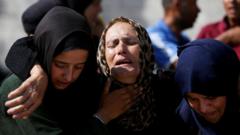The International Atomic Energy Agency pulls inspectors from Iran, raising alarm over the country's nuclear ambitions amid ongoing war tensions.
Cease-Fire Tensions Rise as Iran Suspends Cooperation with Nuclear Inspectors

Cease-Fire Tensions Rise as Iran Suspends Cooperation with Nuclear Inspectors
Iran halts cooperation with the I.A.E.A. amid fears of nuclear bomb development following Israeli conflict.
The United Nations’ nuclear watchdog announced on Friday that its inspectors have exited Iran, shortly after the nation decided to cease cooperation with the agency. This move follows the ongoing conflict with Israel, which has intensified worries among experts regarding Iran's nuclear capabilities. The Iranian government recently enacted a law that limits oversight of its contentious nuclear program, effectively putting international checks on hold.
The timing of this cessation is critical, with analysts cautioning that the beleaguered Iranian nuclear facilities might be propelled underground, complicating verification efforts and the potential for weapon development. In a statement released on platform X, the I.A.E.A. confirmed the safe departure of its inspection team, which had remained in Tehran during the military confrontations.
Tensions escalated following Israel's strikes on Iranian military and nuclear sites amid the war, where reports indicate that such actions were backed by the agency's recent findings of Iran's noncompliance in nuclear nonproliferation assessments. Iranian officials contend that the I.A.E.A's declaration has provided a political shield for Israel's military actions, which resulted in significant damage and loss, including fatalities among nuclear scientists.
While U.S. officials claim that Iranian nuclear sites suffered substantial destruction, I.A.E.A. director general Rafael Grossi cautioned that the situation is still unclear regarding the full extent of damage. He emphasized that Iran's stockpile of highly enriched uranium, capable of facilitating weapon production, remains unaccounted for.
Despite insisting that its nuclear initiatives are purely for peaceful purposes, Iran has been reported to possess around 882 pounds of highly enriched uranium, which could potentially enable the country to develop multiple nuclear bombs, as per the I.A.E.A.'s assessments. Grossi underscored the urgent need for dialogue and verification measures to resume monitoring in Iran.
Iranian lawmakers have laid out two preconditions for reinstating cooperation with the I.A.E.A.: ensuring the security of its nuclear programs and officials, and gaining international recognition of its right to enrich uranium. Nevertheless, Iranian officials have also indicated a willingness to engage diplomatically with U.S. representatives, asserting their commitment to a diplomatic resolution, as voiced by deputy foreign minister Majid Takht-Ravanchi.
The timing of this cessation is critical, with analysts cautioning that the beleaguered Iranian nuclear facilities might be propelled underground, complicating verification efforts and the potential for weapon development. In a statement released on platform X, the I.A.E.A. confirmed the safe departure of its inspection team, which had remained in Tehran during the military confrontations.
Tensions escalated following Israel's strikes on Iranian military and nuclear sites amid the war, where reports indicate that such actions were backed by the agency's recent findings of Iran's noncompliance in nuclear nonproliferation assessments. Iranian officials contend that the I.A.E.A's declaration has provided a political shield for Israel's military actions, which resulted in significant damage and loss, including fatalities among nuclear scientists.
While U.S. officials claim that Iranian nuclear sites suffered substantial destruction, I.A.E.A. director general Rafael Grossi cautioned that the situation is still unclear regarding the full extent of damage. He emphasized that Iran's stockpile of highly enriched uranium, capable of facilitating weapon production, remains unaccounted for.
Despite insisting that its nuclear initiatives are purely for peaceful purposes, Iran has been reported to possess around 882 pounds of highly enriched uranium, which could potentially enable the country to develop multiple nuclear bombs, as per the I.A.E.A.'s assessments. Grossi underscored the urgent need for dialogue and verification measures to resume monitoring in Iran.
Iranian lawmakers have laid out two preconditions for reinstating cooperation with the I.A.E.A.: ensuring the security of its nuclear programs and officials, and gaining international recognition of its right to enrich uranium. Nevertheless, Iranian officials have also indicated a willingness to engage diplomatically with U.S. representatives, asserting their commitment to a diplomatic resolution, as voiced by deputy foreign minister Majid Takht-Ravanchi.






















